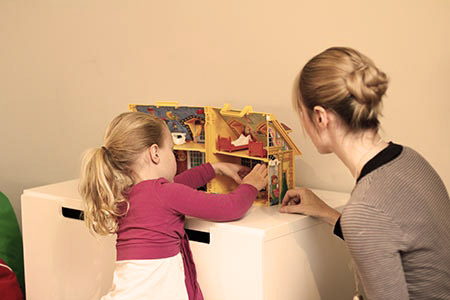Pre-school Aged Children (3-5 years)
The pre-school years are a critical stage of child development. Your child’s current experiences are likely to have a significant impact on their adult life. During this stage, your child will continue to experience dramatic changes in physical growth, as well as his or her ability to learn the social, emotional, behaviour, thinking and communication skills he/she needs for life.
Specific problems we help with in preschoolers:
- Separation anxiety (i.e., when your child is having difficulty being away from you)
- Other anxiety and phobia problems (e.g., fear of the water, fear of the dark, fear of sleeping alone)
- Sadness, grief, trauma and loss
- Toilet issues (encopresis and enuresis problems)
- Family separation
- Sleeping problems
- Eating problems
- Challenging behaviour (e.g., tantrums, non-compliance, hyperactivity)
- Social development
- Anger problems
- Obsessions and habits (e.g., thumb sucking, hair pulling)
- Elective mutism (e.g., when your child doesn’t talk even though they are able to)
- Learning, communication or developmental difficulties
- Clinical disorders such as attention deficit hyperactivity disorder, autism spectrum disorder, global developmental delay, language disorders, other mental health problems
- Assessment services for pre-schoolers may help:
- To understand your child’s developmental strengths and weaknesses
- Children with learning difficulties
- Children who may be intellectually gifted
- Determining school readiness
- With specialized clinical assessments for disorders such as autism spectrum disorders or attention deficit disorder, global developmental delay, language disorders
Therapy services for preschoolers include:
- Family centered therapy – we work with your preschooler, you and their teaching and/or childcare professionals to create a dynamic change for your child across all settings.
- Play based therapies -we conduct counselling and teach new skills via a range of age appropriate activities. Children usually find this process fun and engaging.
- Programs to treat specific mental health problems such as anxiety, phobias, mood disturbances.
- Social skills programs – To enhance your child’s social skills.
- Behaviour management programs to reduce problematic or unwanted behaviour (e.g., hitting, yelling, defiance, temper tantrums, biting etc.).
- Interventions to increase wanted behaviour (e.g., better sleeping behaviour, better feeding behaviour, toilet training, positive communication, independent play).
- Learning enhancement programs
- Home and Kindergarten sessions are sometimes appropriate for this age group

